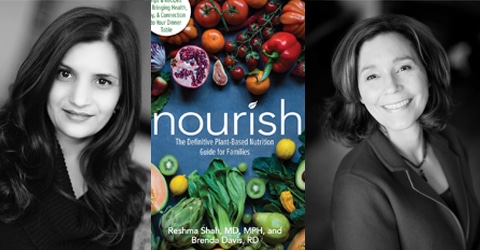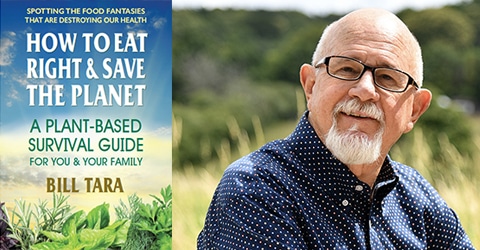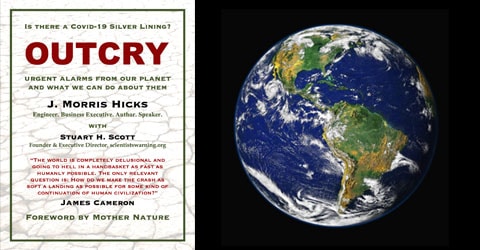

The following is an excerpt from From Plant to Planet: Nudge your way towards healthier, more sustainable food habits (2021, Plantier) by Vivienne Alexa Robinson and Poornima Luthra. It has been lightly edited for consistency with CNS editorial guidelines.
“So What?” The Evidence–Action Disconnect
Food is an integral part of our existence not only physically but also socially. From memories of digging into our grandmother’s curry at family reunions to the enjoyment of hosting a dinner party with friends, food brings us together. It may bind us to our culture, religion, region, or community. Food choices are also deeply personal. As you consider embarking on a journey toward a plant-based lifestyle, you may find that your personal food choices become part of the public conversation. You may be confronted with barriers. Some of these barriers arise within us, while others are external. We feel that understanding what these barriers are and why they might arise is a key step in helping you along your personal path.
Despite global consumer trends shifting in favor of plant-based diets, the rise of plant-based food manufacturers offering us greater and tastier choices, and the clear call for action by doctors and scientists, a lot of us still struggle to change our food choices.
It’s not easy. In fact, quite the opposite. As we move toward eating more sustainably, one tool at our disposal is trying to understand where the resistance to change comes from. Some cite eating routines, health beliefs, enjoyment of meat, and perceived difficulties in preparing plant-based foods as barriers. These barriers are strongly linked. That is, we may not recognize enough of the differences between them, which can make the barriers seem even more unsurmountable.
So how do we overcome these barriers? We have found that an approach which embraces knowing, acknowledging, and addressing them is the best way to move forward.
We believe that there are six main barriers to adopting more plant-based meals. Let’s break them down together.
Barrier #1: Cultural Traditions
The link between food and culture is deeply entwined. The world over, communities bond over food, and every society prides itself on its unique cuisine. Food is also a great way to get to know and understand a culture, as food is often integrated with traditions and practices. For the Western world, eating turkey at Thanksgiving or a roast pig at Christmas are deeply rooted cultural practices. Switching to plant-based alternatives can seem strange and counterintuitive. In some cultures meat consumption is not just a dietary preference, but also a reflection of status and wealth, and it might seem inconceivable not to serve meat at special occasions like festivals and wedding banquets.
Barrier #2: Generational Gaps
There also appears to be a food generation gap between baby boomers and millennials. The former was raised post World War II, during a period of food scarcity and significant changes to food production. They grew up believing and being told that cow’s milk was the best source of nutrition (in particular, believing that calcium is essential for healthy bones) and that meat was essential for protein and growth. Millennials, on the other hand, are redefining what healthy eating means. They favor food that is natural, organic, locally sourced, or sustainable, and it seems they are the driving generation toward plant-based and plant-forward eating, followed by Gen Z and Gen X.
Nonetheless, the millennial-led push toward more plant-based diets seems to be gaining ground across an increasing number of colleges and universities, who have entirely or partially removed animal products from their cafeteria menus. They include the University of Cambridge, Oxford University, Goldsmith, University of London, University of California, and a growing list of colleges who are now part of a Meatless Monday movement.

Author, Poornima Luthra
Fiona Dyer, a consumer analyst at GlobalData explained: “The shift toward plant-based foods is being driven by millennials, who are most likely to consider the food source, animal welfare issues, and environmental impacts when making their purchasing decisions.” Health seems to be the motivator for baby boomers, while environmental impact and animal welfare are the motivating factors for millennials and Gen Z consumers. Regardless of the reasoning, we are certainly seeing a generation shift. 60 percent of Gen Z want to eat more plant-based foods and 79 percent of them are already eating plant-based 1–2 times a week.
Barrier #3: Cognitive Dissonance
In her book Why We Love Dogs, Eat Pigs, and Wear Cows: An Introduction to Carnism, social psychologist Melanie Joy introduces carnism, the belief system and psychology of meat eating. Carnism, according to Joy, is the driving, dominant force supporting the choice to eat meat in modern culture. Joy believes that the choice to eat meat is strongly influenced by social conditioning. She claims that despite meat-eating tendencies, the majority of people care deeply about animals and don’t want them to suffer.
In societies where it is hard to find a concrete link between the food they eat and its environmental impact, eating sustainably can seem like an abstract idea to be addressed by future generations, with people believing that their individual actions are too insignificant to make any difference. In highly urbanized cities where agricultural activity is not visible, citizens eat three to five times more meat and eggs than is environmentally sustainable. This mental disconnect, or cognitive dissonance, between the food on our plates and how that food is grown or produced, has many underlying causes including geography, socio-economics, and education levels.
Barrier #4: Negative Associations
There is an important difference between a plant-based diet and veganism. People following a plant-based diet do not consume animal products but may still choose to use them in other areas of life such as clothing, accessories, and toiletries. Vegans, on the other hand, do not consume or use any animal products. Often but not always their decision is based on views regarding animal welfare and rights. Unfortunately, there are sometimes negative assumptions concerning those who practice veganism and consume vegan diets, and their personal choices are sometimes perceived to be politically motivated or activist in nature. The negative perceptions and stereotypes may be shaped in part by extreme cases in which vegan activists have engaged in violence, threats, and disruption toward farmers, journalists, restaurants, supermarkets, and other establishments.

Author, Vivienne Alexa Robinson
Barrier #5: Misinformation
With more people embracing greener diets, many food manufacturers have capitalized on this growing consumer group by introducing a deluge of vegan-friendly foods aimed at making it attractive for consumers to jump on the vegan bandwagon. However, many of these vegan junk foods do not contribute as much to the improved health of our planet or our bodies, are high in sugar and fat, or are highly processed. This has led some skepticism about the actual benefits of vegan and vegetarian diets.
Barrier #6: Dining Out
We all love a nice hygge (Danish for “cozy”) meal out with family and friends, enjoying great food and lovely company. When you’re considering incorporating more plant-based options in your meals, choosing where to eat and what to order can seem daunting and can even be a deterrent. After all, no one wants to be met with blank stares from waitstaff or be made to feel like an inconvenient customer.
References
- Pohjolainen P, Vinnari M, Jokinen P. Consumers’ perceived barriers to following a plant-based diet. British Food Journal (2015);117(3):1150–1167. doi:10.1108/BFJ-09-2013-0252
- Danley S. Holistic nutrition cuts across generations. FoodBusinessNews.net. August 29, 2019. https://www.foodbusinessnews.net/articles/14408-holistic-nutrition-cuts-across-generations
- Impossible Foods. Kids in the kitchen webpage. June 26, 2019. https://impossiblefoods.com/blog/generational-trends-kids-in-the-kitchen
- Joy M. Why we love dogs, eat pigs, and wear cows: An introduction to carnism : the belief system that enables us to eat some animals and not others. Berkeley, Calif.: Conari (2011).
- Vanham D, Mak TN, Gawlik BM. Urban food consumption and associated water resources: The example of Dutch cities. Sci Total Environ. 2016;565:232-239. doi:10.1016/j.scitotenv.2016.04.172
Copyright 2026 Center for Nutrition Studies. All rights reserved.
Deepen Your Knowledge With Our
Plant-Based Nutrition
Certificate
Plant-Based Nutrition Certificate
- 23,000+ students
- 100% online, learn at your own pace
- No prerequisites
- Continuing education credits





